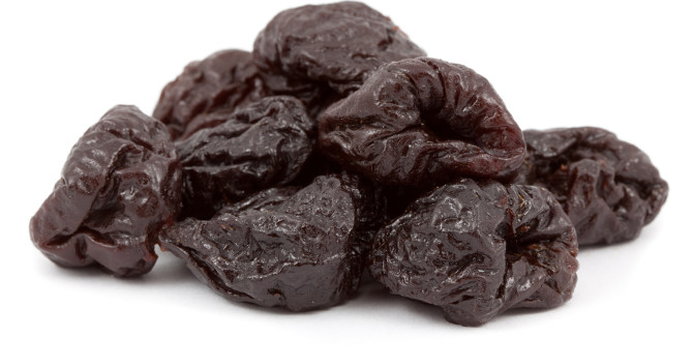Dried plums, also referred to as prunes, are a highly nutritious fruit. They are a rich source of dietary fiber. They contain antioxidant nutrients such as beta carotene, vitamin C and vitamin E. They also contain phytochemicals which have antioxidant properties. Minerals in the fruit include potassium and copper. The plum is also a good source of carbohydrates and sugars, which provide energy. A serving of 5 plums supplies about 25 grams of carbohydrates and 15 grams of sugar-glucose and fructose.
Antioxidant Properties
The fruit contains special phytonutrients that have potent antioxidant properties. These phytonutrients boost the body's immunity. They help to neutralize free radicals and protect the body's cells from damage by carcinogens. Research has shown that special phytonutrients help to protect cells from oxygen-related damage. A quarter cup provides about 17 percent of the daily value of vitamin A in the form of beta carotene. This is a powerful antioxidant that helps to eliminate free radicals.
Potassium
A quarter cup of dried plums provides about 10 percent of the recommended daily value. Potassium helps to sustain healthy blood pressure. It also prevents buildup of plaque in the blood vessels. This improves heart health and lowers the risk of stroke and coronary disease. Potassium has also been established as an essential mineral for healthy bones. It helps to prevent urinary calcium loss which prevents loss of bone density. Potassium-rich foods that include dried plums can help lower the risk of osteoporosis.
Dietary Fiber
A quarter cup of dried plums provides about 15 percent of the daily recommended value. Soluble fiber in dried plums helps to regularize blood sugar levels. It slows down the discharge of food from the stomach after a meal, as well as absorption of glucose. Soluble fiber also enhances insulin sensitivity. Studies have established that soluble fiber can help prevent type 2 diabetes. This fiber is also a helpful strategy in weight loss endeavors. It promotes a sense of fullness after a meal and helps to curb the need to eat more. This helps prevent weight gain. Insoluble fiber provides bulk to fecal matter. This accelerates the discharge of fecal matter from the gut. Colon cells are exposed to harmful toxins for a shorter time, which reduces the risk of colon cancer.
It has also been established that insoluble fiber produces an acid that lowers bad cholesterol levels. Propionic acid helps to inhibit the activities of an enzyme that plays a role in cholesterol produced by the liver. Soluble fiber attaches to bile acids which are then eliminated through stools. These acids are used to digest fat produced by the liver from cholesterol. Once these acids are excreted, the liver is compelled to produce new acids and in the process, more cholesterol is used. This lowers cholesterol levels in the blood.
Dried Plums and Oxalates
Prunes contain oxalates which have raised health concerns. These substances occur in plants, animals and humans. High concentrations of these compounds lead to crystallization which can cause health problems. It is recommended that if you have kidney or gallbladder problems, you should avoid dried plums. This reduces the risk of kidney stones associated with oxalates.



